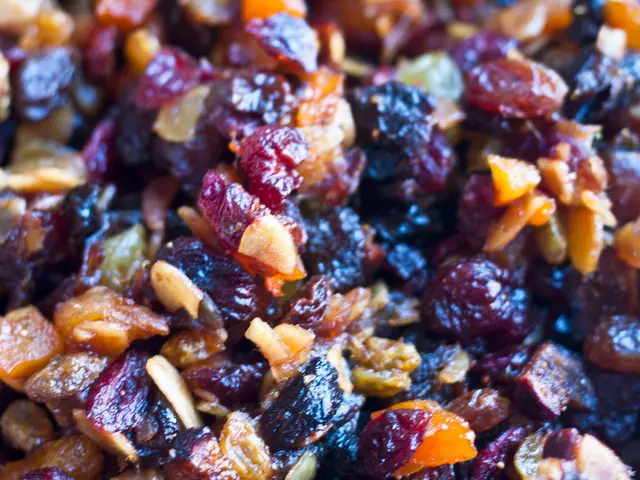Instructions for Brewing Kombucha Vinegar
Turn your homemade kombucha into something truly special by transforming it into vinegar! This easy-peasy recipe lets you make the best of forgotten batches, or simply turn overly sour kombucha into a delicious, vinegar-y treat.
Kombucha, a fermented drink made from sweetened tea, is known for its slightly sweet, tangy, and fizzy flavor. But as it continues to ferment, it transforms into vinegar naturally! So, if you've got a kombucha that's too tangy for your taste, don't toss it; convert it into vinegar instead!
Making kombucha vinegar offers the same health benefits as apple cider vinegar, boasting probiotic bacteria, antioxidants from tea, and powerful organic acids. In the kitchen, kombucha vinegar can take the place of any vinegar - cider, white, or otherwise - and serves as a great base for creating a variety of flavors.
So, why let your kombucha go to waste when you can make vinegar out of it? Let's dive right into it!
Why is my kombucha too vinegary?
If you forget your kombucha for just a smidgen too long, it'll become overly sour. During the kombucha fermentation process, two things happen simultaneously:
- Yeasts take the sweetness (sugar) and convert it into alcohol and CO2.
- Bacteria then turn the alcohol into acid.
When making kombucha, we stop the fermentation after about a week to enjoy an effervescent, slightly vinegary, and somewhat sweet drink. If you let it go longer though, almost all the sugar in the kombucha will be turned into acid, giving you kombucha vinegar!
How to make kombucha vinegar?
Equipment
- Wide mouth jar (around 4 litres)
- Cloth and rubber band for covering the jar
- Filter
- Bottles
Ingredients
- 1 kombucha scoby and its liquid culture (approx. 350ml)
- 12g plain tea (6 tbsp.)
- 200g sugar (1 cup)
- 2.5L chlorine-free or filtered water
Steps
Preparation
- Boil about 500ml of water and blend it with the tea. Use tea bags or a nylon filter bag for easier brewing.
- Let it steep for about 10 minutes, then remove the tea.
- Stir in the sugar until dissolved, then add the remaining water to have a total of 3L.
- Add the kombucha scoby with its liquid culture.
- Cover the container mouth with a cloth and a rubber band.
- Store it in an airy place, away from light, and at room temperature (ideal temperature between 20°C and 30°C).
Fermentation
- Ferment for at least 70 days; the taste and acidity will intensify as it ferments further.
- After 70 days, remove the scoby gently and strain the kombucha vinegar through a nylon filter over a jar to remove any particles. Do not stir the bottom of the fermentation container; you don't want any yeast in the vinegar as it can produce an unpleasant taste.
Bottling
- Fill clean bottles almost to the neck using a funnel.
- Store at room temperature. Kombucha vinegar won't become fizzy if it ferments long enough.
Tips to make better kombucha vinegar
- Aeration:Make sure your fermentation jar is in a well-ventilated area for the bacteria to get enough oxygen to convert alcohol into acid. For faster fermentation, consider using an aquarium air pump.
- Temperature:A temperature of 25 to 30°C is ideal for vinegar production, but lower or higher temperatures will yield good results with a longer fermentation time.
- Time:It's crucial to let your kombucha vinegar ferment for long enough so that all the sugars are converted into alcohol and then into acid.
- Flavouring: You can flavor your kombucha vinegar like you would kombucha. If you add sweet ingredients during flavoring, it's best to add them at the start of fermentation so that the sugars are transformed during fermentation. Kombucha vinegar can also be used as a berry shrub base. To prevent further fermentation when adding sugar, consider heating the vinegar before use to pasteurize it.
Go ahead and give kombucha vinegar a try! The acidity might be a little milder than commercial vinegar, so use double the amount for recipes, and enjoy the endless possibilities it offers for flavor exploration. Kombucha vinegar can replace apple cider vinegar, white vinegar, and many other types of culinary vinegar in salad dressings, marinades, or mayonnaise. It can also be used as a plant extractor for making a scoby tincture, diluted to create a refreshing morning tonic, and used as a household cleaner or stain remover. So, when you love kombucha vinegar, you can use it everywhere!
- Transforming kombucha into vinegar is a great way to make use of forgotten batches or overly sour kombucha, providing a healthier alternative to store-bought vinegars with its probiotic bacteria, antioxidants, and organic acids.
- To enhance your culinary choices, kombucha vinegar can be used interchangeably with any vinegar in cooking, offering a unique flavor profile that can elevate salad dressings, marinades, or even homemade mayonnaise.
- For a more vibrant and flavorful kombucha vinegar, consider adding berries, herbs, or spices during the fermentation process, creating a versatile condiment that can be used in a variety of health-and-wellness, food-and-drink, and lifestyle applications.








